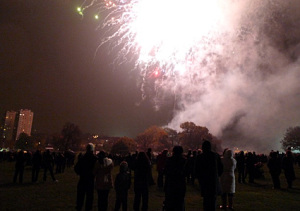I’ve found a lot of evidence that pollution in the 1970s cooled the climate and that the ending of this pollution caused the 1970-2000 warming. I’m trying to test this hypothesis by looking for a link between events like the 4th July which involve fireworks and smoke and a dip in temperatures.
The early indications are that I’m finding a definite “dip” (the dip is still in the noise – but almost every station appears to have a dip). But my expectation was that the trend would deepen toward the present. In contrast, I’m finding that the dip is reducing.
My reasoning for expecting a deepening dip, is based on my experience in the UK where on the 5th Nov, the sky now seems to be filled with fireworks with everyone apparently having boxes of fireworks including massive mega-blasters – nothing like when we were kids. The result is far more smoke than I remember as a child.
But I’m starting to get indications the temperature dip from the 4th July was greater in the 1950s/60s.
That’s raising questions which living in the UK I’m unable to answer. So if you are American and particularly if old enough to remember the 1950s or even 1960s you could help me immensely.
The questions I have are as follows:
- When do the US celebrate the 4th July
This may sound an odd question, but I’m getting a dip in temperatures much earlier than expected. I have read suggestions that it was common at one time to celebrate on the evening of the 3rd July. - Is it always the 4th July
I read somewhere that if the 4th July is on a Sunday, the celebrations are on another day. Is this true ? - What smoke etc. was common in the 1950s/1960?
The decreasing size of the dip worries me. So I’d really like to know the relative frequency of the following and whether there is more or less now:- Simple bonfires (both family and community)
- BBQs
- Fireworks
- Was the 4th July an occasion for Long car journeys.
- Did Industry Shut down
Being a holiday many companies would shut down. Again was this more or less common in the 1950s/60s
Finally, is there any thing else that may have caused an electricity or power surge, or resulted in any activity that would increase or reduce energy use or pollution?
Thanking you in Advance
I would really appreciate your help because if I can find what activity has reduced since the 1950/60s then this would really help me zero in on the cause of early 20th century cooling – which if the hypothesis is correct, then produced warming as this cooling pollution was reduced from 1970-2000.



Do you need to look at the Clean Air Act in the 1960s? Prior to that we had the London pea souper fogs which were ended by the legislation.
I am a Canadian living on Vancouver Island, British Columbia. I seem to recall that the North West Passage was open and Amundsen sailed the passage in 1902 – 1904 and the RCMPV St. Roch sailed the passage in a single season in 1942. There was cooling in the 50’s to early 80’s followed by warming which peaked in the late 90’s. One of the issues during the cooling period was the burning of coal and high sulfur fossil fuels creating among other things acid rain.My personal opinion is that ocean currents were an influence.
Presumably with the prevailing winds bringing the acid rain from the US to Canada I ought to find some press clippings on the subject?
Apparently not a lot of old Americans read your blog. I can comment on 4th of July celebrations in the lat 1950s and early 1960s in small towns in central Minnesota. Every small town had a fireworks display, always on the 4th, but they were not nearly as big as modern displays. Forth of July parades and picnics were standard, but I don’t really remember much grilling of food. In those days picnics were mostly sandwiches and cold food. Fireworks were often launched near the town baseball field, so the hotdog concession was often open and that is where you got hot food. People did not drive far for the 4th, mostly you walked (or rode your bike) down to mainstreet and watched the parade, had a picnic in the park, and then regrouped at the fireworks venue.
Thanks – that’s a very useful description which gives me a very good idea of what kinds of smoke was and wasn’t going into the air. And if fits with what I’m finding.